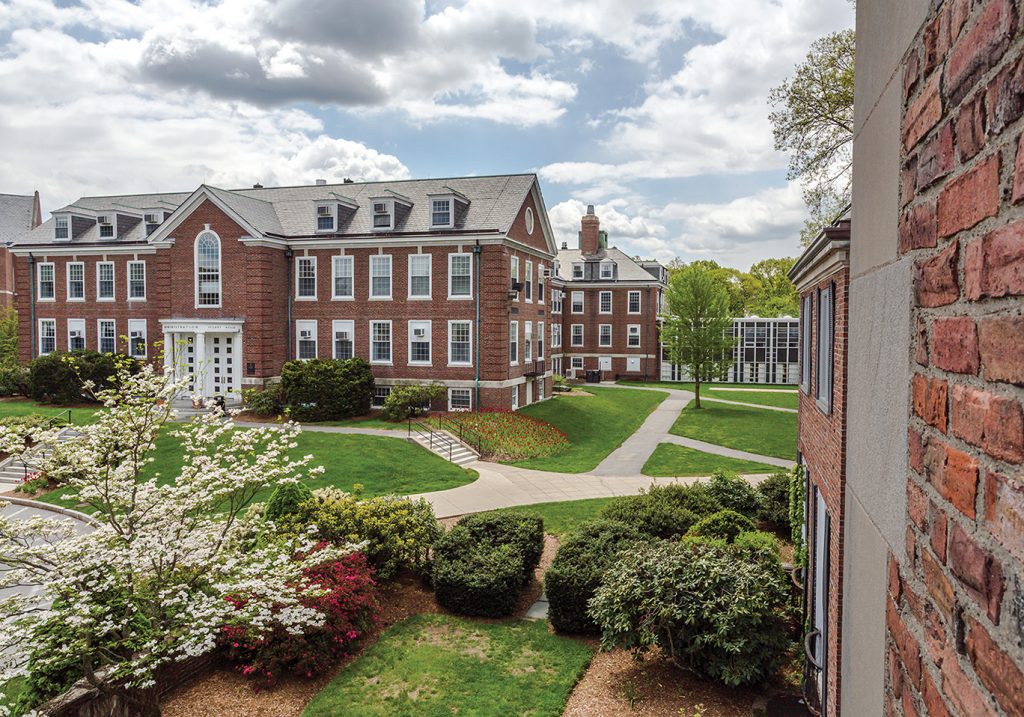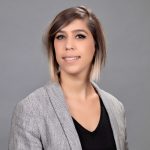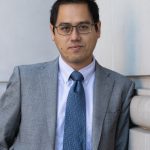Boston College Law School has hired eight new faculty for the 2024-2025 academic year, the largest single cohort in recent history. Together with the five arrivals in 2022 and the two in 2023, the newcomers signify a dynamic period of scholarly growth and range for the Law School, adding expertise in everything from technology, bioethics, and criminal law, to intellectual property, child welfare, and constitutional law.
“We are so proud to welcome the newest members of our faculty,” said Odette Lienau, the Marianne D. Short, Esq., Dean at BC Law. “Each of them brings new perspectives, extensive skills, and a commitment to excellence that will impact our students’ learning and careers for years to come. They will be incredible members of our academic community.”
Seven of the new faculty hires are noted below. The eighth will be announced shortly.
Yan Fang, a sociologist of law, joins BC Law as an assistant professor. Her doctoral dissertation on that topic at the University of California, Berkeley, examines how internet technology companies shape the capacity of law enforcement officials to carry out their responsibility to gather evidence.
More broadly, her research sits at the intersection of law, technology, and society, and theorizes the organizational processes that shape legal actors’ access to and use of information. Fang is also part of an interdisciplinary collaboration studying federal courts’ disposition of disability discrimination cases, which has her comparing how judges evaluate evidence produced by organizations versus evidence produced by individuals.
“As a qualitative researcher, I spend a lot of time collecting and analyzing data to identify patterns that are hard to see without empirical study,” Fang explains. “Our legal system is undergoing major socio-technological changes, and I am excited to engage with students and colleagues at Boston College Law School in understanding those changes and assessing their normative implications.”
She received a BA from Harvard and a JD from UC Berkeley, after which she clerked for the US Court of Appeals for the Sixth Circuit and the US District Court for the Southern District of Texas. She also spent several years as an attorney at the Federal Trade Commission litigating violations of privacy and consumer protection law.
Mitchell Chervu Johnston, on the heels of a fellowship with Harvard Law School’s Project on the Foundations of Private Law, joins BC Law as an assistant professor. The fellowship was an academic investigation of common law subjects such as property, contracts, torts, and related subjects such as intellectual property and commercial law.
Other research interests include an analysis of private law from an economics perspective, with a particular focus on remedies. His current work studies the effects of positive transaction costs on networks of transactions as well as sub-compensatory damages as a potential solution to recurring problems in tort law.
Johnston was previously employed by Mayer Brown in its Supreme Court and Appellate practice, and he clerked on the US Court of Appeals for the Second Circuit. He received his JD from Yale University and a BS in engineering from Princeton University.
“I’m thrilled to be joining the amazing community at BC Law,” he says. “I’ve long admired the work of the BC Law faculty and I’m excited to be able to engage with them on a daily basis.”
Andrea Olson, who specializes in civil procedure, remedies, federal courts, and structural constitutional law, taught at Harvard Law School before being named an assistant professor at BC Law.
Olson’s research focuses on federal court jurisdiction and how the distribution of judicial power affects federalism challenges, separation of powers problems, and institutional legitimacy. Her work seeks to expose tensions and inconsistencies within procedural, remedial, and substantive law and reconcile incompatible rules. Olson’s research is motivated by a belief that analyzing structural and remedial logic in the law is critical for promoting systemic integrity and fundamental fairness.
Olson previously worked in state government and in healthcare regulatory consulting, clerked on the US Court of Appeals for the Ninth Circuit and US District Court for the Northern District of California, and practiced with Latham & Watkins in San Francisco. She earned both her BA and JD at the University of California, Berkeley.
Olson says that she is “delighted and immensely honored to become a part of the Boston College Law School faculty,” stating that she has “been so inspired by the generous, thoughtful, insightful, and kind community, as well as the energetic, motivated, and passionate student body. The campus has a vibrant and contagious energy that I know will fuel rich and meaningful discussions and ideas. I can’t wait to join this fall.”
Ana Rivera ’95 made her mark at BC Law several years ago as a visiting clinical professor in the Civil Litigation Clinic. She assumes the new title of associate clinical professor and will focus on housing justice. In her previous role, Rivera was instrumental in the creation of BC Law’s Covid Relief Housing Clinic, which operated at the height of the pandemic in 2021 to address growing housing uncertainty. Rivera has taught property law as a faculty fellow at New England Law | Boston and most recently founded and directed the Housing Rights Advocacy Clinic at Northeastern University School of Law.
Before teaching, Rivera was a litigator at Boston law firms, including Todd & Weld and Peabody & Arnold, specializing in commercial litigation, employment law, and insurance defense. Rivera earned her JD from Boston College Law School and her BA from Smith College. After graduating from law school, she served as a law clerk to the Justices of the Massachusetts Superior Court.
“BC Law’s clinical programs have a rich history serving underrepresented communities facing housing insecurity. It’s a privilege to be returning to the BC Law family to build on that long tradition of housing advocacy.”
Shelly Simana is a widely published scholar whose research focuses on the intersection between bioethics and law, and addresses questions resulting from genetics, reproductive technologies, and biotechnology. She is joining BC Law as an assistant professor.
She brings to the Law School her experience as a postdoctoral fellow at the Center for Law and the Biosciences at Stanford Law School and as a doctoral candidate at Harvard Law School.
Throughout her career, Simana’s work has been published in numerous law reviews and peer-reviewed journals, including UC Irvine Law Review, Yale Journal of Law & Technology, Journal of Law, Medicine & Ethics, Journal of Law and the Biosciences, and Journal of Medical Ethics, and has been cited by the New York State Supreme Court.
While pursuing her doctoral degree, Simana was a teaching fellow at Harvard’s schools of law, medicine, and public health, and a research associate at the Harvard Kennedy School of Government. Earlier, she served as a visiting scholar in bioethics at the National Institutes of Health, an associate attorney at S. Horowitz & Co, and a clerk in Israel’s High Court of Justice Department at the State Attorney’s Office. Simana received her LLM and SJD from Harvard Law School and her LLB and BA in government from Radzyner School of Law, Reichman University, Israel.
“I’m over the moon about joining Boston College Law School and can’t wait to be part of such an enriching and fulfilling academic environment,” she says of her next scholarly step.
Carlos Masashi Teuscher comes to BC Law as an associate clinical professor from Suffolk University Law School, where he founded that school’s transactional clinic, providing legal counsel to small businesses and nonprofits in low-income communities and communities of color in the Greater Boston area.
“I am excited to be joining BC Law and to work with its leading faculty, staff, and student body. The Community Enterprise Clinic at BC Law has been a long-standing provider of transactional legal services to small businesses and nonprofits in the Greater Boston area,” Teuscher says.
Teuscher’s experience is extensive. For a time, he was a lecturer and clinical instructor at Harvard Law School, where he directed the Community Enterprise Project. He has taught courses ranging from secured transactions and business law, to community economic development and transactional lawyering in the public interest. He has also published in MCLE’s Massachusetts Condominium Law, has presented at several national conferences for clinical professors, and is very active in Massachusetts and nationally on issues relating to cooperative and other democratically owned enterprises.
Prior to teaching, Teuscher practiced transactional law at the international firms Linklaters and Dechert. He currently serves as a member of the Supreme Judicial Court Standing Committee on Pro Bono Legal Services. He received his JD from Georgetown University Law Center and his BS in biological sciences from the University of Southern California.
“I am thrilled to continue the Community Enterprise Clinic’s legacy to teach transactional lawyering skills to students as they provide essential legal services to support community-owned and controlled enterprises in low-income communities and communities of color in Massachusetts,” Teuscher says.
Adnan A. Zulfiqar, an interdisciplinary scholar in the fields of law, history, and religion whose research focuses on critically examining frameworks underlying legal discourses in both domestic and global contexts, assumes the role of associate professor at BC Law and a courtesy appointment in Boston College’s Theology Department. He comes from Rutgers Law School.
His primary fields of inquiry have been into criminal law and procedure, Islamic law, and the rule of law in the Global South. Zulfiqar’s most recent scholarship studies how Muslim jurists conceive of and utilize collective duties, particularly in the context of war and revolution. He has spent over a decade working in the Middle East, South Asia, and sub-Saharan Africa.
Zulfiqar has held numerous fellowships, including at the University of Pennsylvania, Stanford, and Damascus University in Syria, and was a Harry F. Guggenheim Fellow. A number of journals have published his work, among them the Yale Journal of International Law and Harvard’s Journal of Islamic Law.
He is a former international legal consultant for the United Nations Development Programme, where he assisted with the drafting and implementation of new criminal codes and commentaries for the Republic of the Maldives. He also helped draft a new criminal code for Somalia under the auspices of the International Development Law Organization.
Zulfiqar’s past experiences extend to private practice at Hogan Lovells in Washington, DC; to Congress as a legislative staffer to US Senator Max Cleland; and to the Philadelphia Human Relations Commission as a commissioner. From the University of Pennsylvania, he earned three degrees: his JD and his MA/PhD in near eastern languages and civilization. He received his MLS in international affairs from Georgetown University, and his BA from Emory University.
Zulfiqar says that he is “incredibly excited to be joining this vibrant community committed to intellectual inquiry, to finding solutions for society’s moral and ethical challenges, and to situating itself as part of a larger global discourse.”









